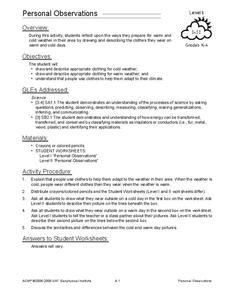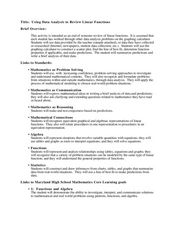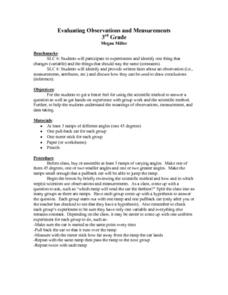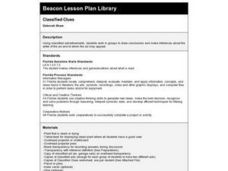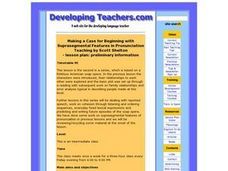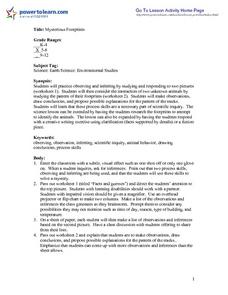Curated OER
What Can Scatterplots Tell Us?
Eighth graders use data from surveys conducted with parents, peers and themselves to create computer-generated scatterplots. They make inferences from their scatterplots.
Curated OER
Personal Observations
Pupils determine the appropriate clothing for warm and cold weather. In this weather and clothing lesson, students draw and describe appropriate clothing for cold and warm weather.
Curated OER
Wilson Stands Alone in His Plan for World Peace
Students study the Fourteen Points. They examine motives behind Wilson's Fourteen Points and why most of them were rejected by France. They answers questions concerning primary resources (casualty list and before and after...
Curated OER
What's the Best Deal?
Young scholars explore number sense by solving consumer math problems. In this pattern identification lesson, students analyze a list of numerical and geometric patterns while predicting the future outcome. Young scholars utilize...
Curated OER
Using Data Analysis to Review Linear Functions
Using either data provided or data that has been collected, young mathematicians graph linear functions to best fit their scatterplot. They also analyze their data and make predicitons based on the data. This lesson is intended as a...
Curated OER
Evaluating Observations and Measurements
Third graders review the scientific method and how and in which steps scientists use observations and measurements. Then as a class, they hypothesize which ramp will send the car the farthest. They break into groups and send cars down a...
Curated OER
Classified Cues
Learners analyze classified advertisements to make inferences about who wrote the ad and who may find the ad appealing. They write their own classified ads based on what they have learned.
Curated OER
Footprint Detectives: Making Inferences Using Dinosaur Trackways
Students analyze and discuss footprints and dinosaur tracks. They listen to books about paleontologists, create and analyze their own trackways using black paper and chalk, examine the data, and form hypotheses about footprints and...
Curated OER
From Seeds to Plants
Second graders review the process of plant reproduction and the role of seeds in that process. The students dissect a seed, analyze their finds, collect and record data, and make predictions about seed germination and plant growth.
Curated OER
Birds Nesting Habits
Learners explore nesting habits of birds, and demonstrate reading comprehension skills, including reading strategies, inference, literal meaning, and critical analysis.
Curated OER
Take Only Photos and Leave Only Bubbles
Students make careful observations and record their observations. They communicate their findings with their peers and analyze data collected about a site. They determine what it means to be a looter, and feel the direct effects of...
Curated OER
Making a Case for Beginning Wigh Suprasegmental Features in Pronunciation
Students explore the ways in which voice quality and intonation can convey meaning.
Curated OER
Tower of Hanoi Lesson Plan
Young scholars investigate the Legend of the Tower of Hanoi and complete mathematical problems related to the legend. They play the Tower of Hanoi game online in order to discover the number pattern involved. They solve problems using...
Curated OER
The Human Body Systems - Lesson Plan
Students identify the following organ systems in the human body and state their functions: muscular, skeletal, circulatory, respiratory, digestive.
Curated OER
The Brain and the Sense Organs - Lesson Plan
Students identify the five sense organs and state the uses of the five senses.
Curated OER
Energy Concepts - Lesson Plan
Young scholars state the different forms of energy; and observe the effects of energy changing from one form to another (other forms) in electrical appliances.
Curated OER
Ozone Hole Expert Groups
Research topics associated with the hole in the ozone layer over Antarctica. Researchers write five facts about their topic and one question for each of those facts. They present what they learned to the rest of the class. Six topics are...
Science 4 Inquiry
Layers and Laws: The Law of Superposition and Index Fossils
What can layers of rock teach us about the climate? Young scientists solve a mystery about who stole a cookie by applying the law of superposition. Then, they apply the same concept to solve a more difficult mystery, trying to determine...
Science 4 Inquiry
Plant Structures Lab Stations
In China, hibiscus is known as the shoe flower because it is used to polish shoes, while in Hawaii, it is honored as the state flower. Young scientists learn about the structure and function of flowers. They dissect hibiscus flowers,...
Curated OER
Statistics and Shopping
Students examine statistics and data analysis concepts from the practical questions that arise in everyday life.
Curated OER
Magazine Madness
Young scholars look at pictures cut out of magazines to determine what is happening in the picture and predict what will happen next.
Curated OER
Water: On the Surface and in the Ground
Students explore the differences between surface water and ground water. They collect data using maps and graphs and investigate a Texas river basin and a nearby aquifer. They complete a written report including maps and data regarding...
Curated OER
Mysterious Footprints
Students, after observing and responding to two pictures, consider the interaction of two unknown animals by examining the pattern of their footprints. They make observations, draw conclusions and propose possible explanations for the...
Alabama Learning Exchange
Animals as Pets: Everything You Need to Know
Students complete internet based research on pet care in order to prepare a written and oral presentation for the class. They examine the life span, environment, food and grooming of the pet they chose to research. They complete the...



